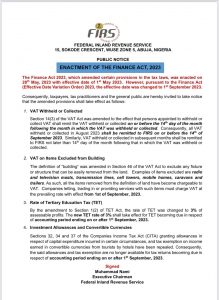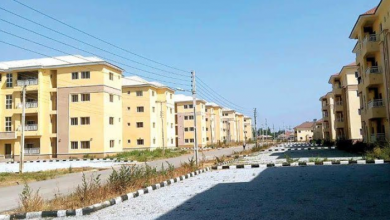Professionals set target for FCT as real estate market slows down | Prestige Real Estate News
Professionals set target for FCT as real estate market slows down


There are palpable fears that lack of clear-cut policy by previous Federal Capital Territory administrators may undermine investors’ confidence in the real estate sector, while professional bodies are seeking increased funding, creation of appropriate structures or re-organisation of existing institutions for city planning, provision of basic infrastructure and urban services.

Rising fears have dented the momentum of demand in the real estate market in the Federal Capital Territory (FCT), lowering commercial or residential investments in the housing sector.

The development was heightened by the FCT Minister, Nyesom Wike’s threat and message to property owners of plans to demolish buildings and revoke lands that are not developed or titles illegally obtained from the Federal Capital Territory Administration (FCTA).
Wike told residents, “If you know you have built where you are not supposed to build, it will go down. Be it a minister anywhere, be it an ambassador… if you know you have developed where you are not supposed to, your house will go down.

“And those who have been given Certificate of Occupancy (C-of-O) and failed to develop, and they have become land speculators, the land is gone. I will revoke them.”
Before now, the Abuja housing market had been robust and house types have witnessed rising prices, resulting largely from the rise in cost components such as iron rods, cement and roofing sheets, which constitute about 5-10 per cent of overall building costs.

In the choice districts, pricing in the high-end market has been aggressive and new construction has been brisk. Highly publicised sales of super luxury units gained widespread attention, while those in superior locations commanded strong investor interest.
Currently, there are palpable fears that lack of clear-cut policy by previous Federal Capital Territory administrators may undermine investors’ confidence in the real estate sector as some of the allocated land earmarked as estates for low-income are still locked up by their owners.
The Guardian learnt that land earlier allocated for affordable housing projects were sold to the highest bidders, while low- income earners could not afford houses close to the city centre and live in the outskirts, where there are no infrastructures.
While many anticipate a relief from the FCT after the minister’s comment following abuse in the implementation of the masterplan and housing allocations, apprehension hangs in the air like a mist.
The President, Nigerian Institute of Town planners (NITP), Nathaniel Atebije, said the city was planned from the beginning to enable rational development; but the plan has been abused.

“This is because of lack of reasonable adherence to the provisions of the masterplan and the seeming lack of responsiveness of authorities managing the city to the needs of the population as the city grows.
“The manifestations of these challenges include daily tidal flows of population between the city and the suburbs with insufficient and affordable transportation facilities. The traffic congestion leads to colossal loss of productive time among the workers apart from the frustration and health hazards that the population are exposed to while in traffic.
“Other challenges are shortage of basic urban services, undue pressure on existing infrastructure, the competition for road usage between cars and animals, poor refuse management, lack of public toilets, flooding, slum development, lack of access to affordable housing, illegal developments underpinned by impunity, indiscriminate change of land use, insecurity and increased wave of crimes.”
According to him, the problems got so bad due to insufficient professional staff, equipment, funding and appropriate political will to manage the city. “I am aware of some staff that have been posted to town planning departments, while they are not town planners to carry out planning assignments. Such people are usually imposed on the departments by higher authorities.
“Beyond these, some professionals have compromised standards for selfish gains. This is due to loss of integrity and lack of keeping up with ethical provisions of the profession. The result of this would be wrong decisions with long-term effects on the city,” Atebije said.
The President, Nigerian Institute of Architects (NIA) President, Enyi Ben-Eboh, said: “In addition to the obvious distortion to the original masterplan, there are growing infrastructure deficit that resulted in high demand for housing within the city centre and its immediate environs, thus putting a lot of pressure on the limited infrastructure in these locations.
“There is really no excuse for the lack of a robust mass transit system comprising of an intra-city metro line and a network of buses to ease the pressure of commuting from the satellite communities to the centre of activities in such a manner as to make it attractive for people to live around the satellite towns and work in the city centre. This infrastructure imbalance has to a large extent contributed to the deteriorating state of the city.”
Ben-Eboh noted that a situation where population is growing in an inverse proportion to infrastructure is a recipe for urban decay, adding, “Professionals should be in the forefront of advocacy for best practices in the administration of world class cities and become pressure groups for the promotion of the right policies that would ensure that our cities do not become urban slums.
“Government on the other hand must also realise the importance of urban planning and requisite infrastructure provision that would serve as a catalyst for orderly city growth.”
Atebije advised that ministers and functionaries of government should collaborate with professional bodies to implement recommendations. He also suggested continuous planning and re-planning at all levels (from the regional plan to detailed site development plan and other planning schemes), increased funding, creation of appropriate structures or re-organisation of existing institutions for city planning, provision of basic infrastructure and urban services.
He further called for effective urban management institutions, engagement of professional staff, training and retraining of staff, engagement of consultants for deep analysis of city problems and proffering remedies, giving adequate political support, providing equipment for effective service delivery.
“There is the need to restrain rearing of cattle within the city, provide affordable housing and improve on city surveillance for security, as well as public enlightenment and advocacy through radio/television jingles, town hall meetings.” Atebije added.
The NIA president said: “The first step should therefore be that of planning to match the population with adequate infrastructural provision. Timelines must be established based on data derived from trends in population growth over the years and match them with adequate resources to provide matching infrastructure.
“In addition, there must be adequate monitoring of development to ensure that they are following the master plan. Abuja is probably one of the few big cities of the world that does not have a functional mass transit system. This would have helped a great deal in reducing the pressure on the roads and opening up development in the fringes of the city.”
The Managing Director and Chief Executive Officer, NISH Affordable Housing Ltd, Dr. Yemi Adelakun, advocated completion of ongoing projects, saying works on the metroline and public water should be expedited. “Existing buses should be refurbished and operationalised, while new buses, especially electric or gas, should be purchased to alleviate suffering in the city.
“FCT has to also declare a water, sanitation and hygiene (WASH) emergency to provide potable water, clear and dispose of refuse and establish public toilets, especially in the slums to stem open defecation. FCT should make deliberate efforts to promote low-cost housing by granting land allocation for mass housing, as well as prioritise processing of building approvals and land titles.”
Adelakun explained that since the sale of houses to civil servants occupying them, there had been no attempt to build affordable housing in Abuja. “Private developers, because of profit motives, concentrate on developing market houses. Even government institutions have not been able to cater for the needs of low- and medium-income earners.
“The fact is that there are ready buyers for duplexes, many of such luxury buildings are in various stages of completion and such buildings remain uncompleted and abandoned all over Abuja. Land allocated for mass housing has largely been undeveloped or may have been utilised otherwise,” he added.
He urged the government to give institutions targets to deliberately develop affordable houses and measure them against key performance indicators, adding that land should be made available to cooperatives and private developers for mass houses with strict compliance guidelines.





